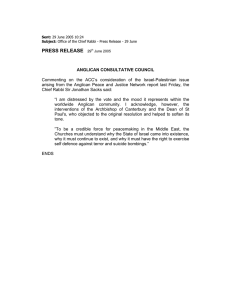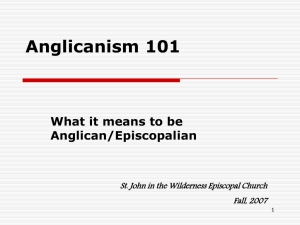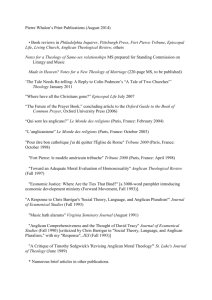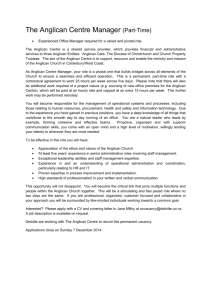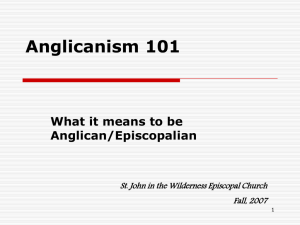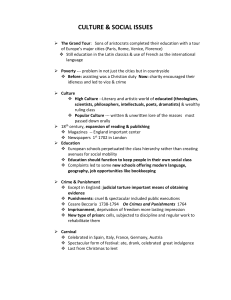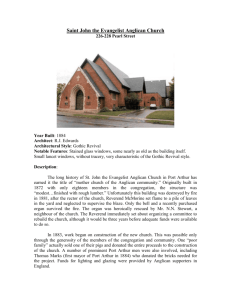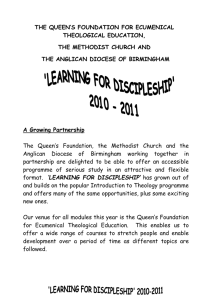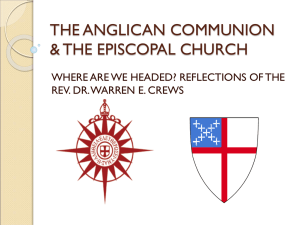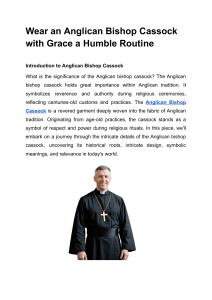Trinity III - St. David's Anglican Church
advertisement
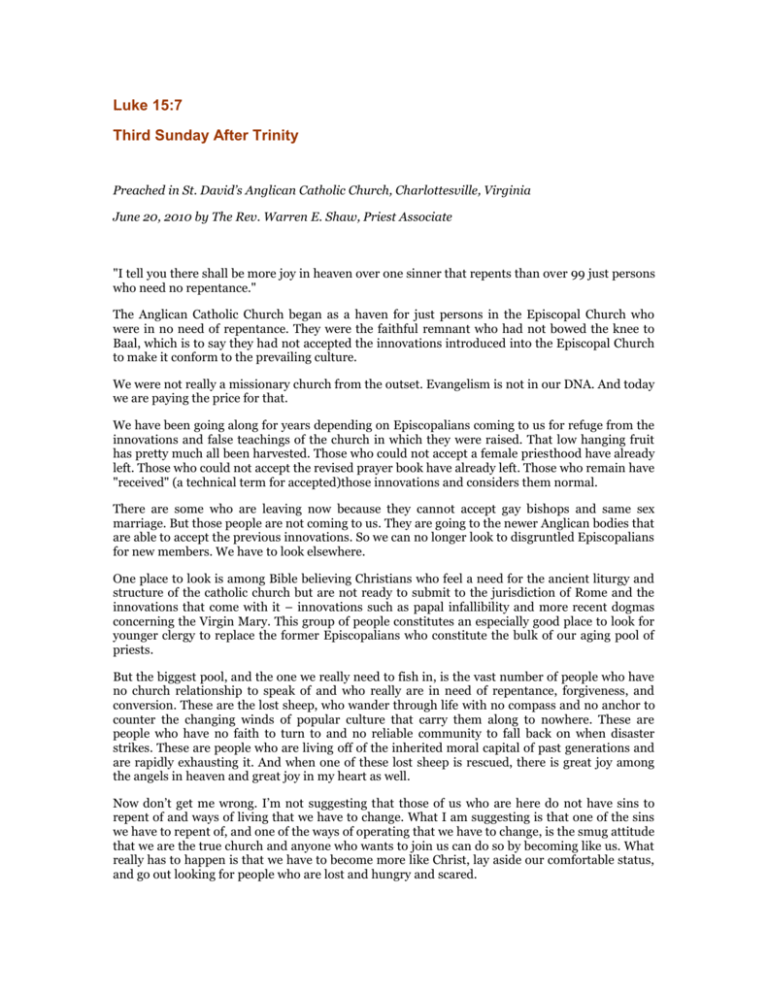
Luke 15:7 Third Sunday After Trinity Preached in St. David’s Anglican Catholic Church, Charlottesville, Virginia June 20, 2010 by The Rev. Warren E. Shaw, Priest Associate "I tell you there shall be more joy in heaven over one sinner that repents than over 99 just persons who need no repentance." The Anglican Catholic Church began as a haven for just persons in the Episcopal Church who were in no need of repentance. They were the faithful remnant who had not bowed the knee to Baal, which is to say they had not accepted the innovations introduced into the Episcopal Church to make it conform to the prevailing culture. We were not really a missionary church from the outset. Evangelism is not in our DNA. And today we are paying the price for that. We have been going along for years depending on Episcopalians coming to us for refuge from the innovations and false teachings of the church in which they were raised. That low hanging fruit has pretty much all been harvested. Those who could not accept a female priesthood have already left. Those who could not accept the revised prayer book have already left. Those who remain have "received" (a technical term for accepted)those innovations and considers them normal. There are some who are leaving now because they cannot accept gay bishops and same sex marriage. But those people are not coming to us. They are going to the newer Anglican bodies that are able to accept the previous innovations. So we can no longer look to disgruntled Episcopalians for new members. We have to look elsewhere. One place to look is among Bible believing Christians who feel a need for the ancient liturgy and structure of the catholic church but are not ready to submit to the jurisdiction of Rome and the innovations that come with it – innovations such as papal infallibility and more recent dogmas concerning the Virgin Mary. This group of people constitutes an especially good place to look for younger clergy to replace the former Episcopalians who constitute the bulk of our aging pool of priests. But the biggest pool, and the one we really need to fish in, is the vast number of people who have no church relationship to speak of and who really are in need of repentance, forgiveness, and conversion. These are the lost sheep, who wander through life with no compass and no anchor to counter the changing winds of popular culture that carry them along to nowhere. These are people who have no faith to turn to and no reliable community to fall back on when disaster strikes. These are people who are living off of the inherited moral capital of past generations and are rapidly exhausting it. And when one of these lost sheep is rescued, there is great joy among the angels in heaven and great joy in my heart as well. Now don’t get me wrong. I’m not suggesting that those of us who are here do not have sins to repent of and ways of living that we have to change. What I am suggesting is that one of the sins we have to repent of, and one of the ways of operating that we have to change, is the smug attitude that we are the true church and anyone who wants to join us can do so by becoming like us. What really has to happen is that we have to become more like Christ, lay aside our comfortable status, and go out looking for people who are lost and hungry and scared. I wish I could give you a plan for doing that, but I can’t. There are people who can, however, and if we seek them out, we can learn from them together. One such person is the chairman of the Evangelism Committee in our own diocese. He keeps throwing out ideas and strategies, but few people seem to pay much attention. It’s time we started paying attention. It’s time we started looking for lost souls. It may not be in our DNA to do that. But DNA is not destiny unless we allow it to be. To recognize a problem and talk about it is the first step in solving it, and our passivity is a problem we can no longer afford to ignore. We are all getting older and we don’t have much of a bench waiting to replace us. That’s not our only problem. There is also the problem of separation from those who should be our allies in the struggle for a true and growing Anglican presence in America. I don’t know how many Anglican bodies there are outside of The Episcopal Church in this country, but I know there are way too many. This alphabet soup is confusing, to say the least, to people who might otherwise be attracted to the Anglican way, and it is certainly sinful. If all of us who call ourselves Anglicans could share our resources, including our buildings and our clergy, we could develop the critical mass needed to have an impact on the kind of people we need to reach -- people who are attracted to Anglican scholarship, Anglican liturgy, Anglican fidelity to the apostolic faith-- but such people are rightly repulsed by the pettiness and infighting that they see among us. I know there are substantive issues as well as personal issues that keep us from getting together, but there were substantive differences and personal issues among the apostles as well and among the churches that they founded. They found ways to work them out. When outsiders in those days looked at the church they said, "Behold how they love one another." That’s not what outsiders say today. Now when people see the complex array of American Anglican churches what they say is, "Why can’t you guys get your act together?" I realize that as laymen and parish priests there’s not a lot we can do about our unhappy divisions. It’s the bishops that have to do the heavy lifting. But the bishops are our bishops. We elect them, and we have a right to tell them how much we need them to lead us to unity. We can also keep open the lines of communication and establish new ones with local people that we know or should know in other churches. Until now, the focus of our agenda as a parish has been on getting into a building of our own. Now that we are almost there, we need to think about expanding our agenda. We’re going to be more visible, and we need to be working on ways to take advantage of that increased visibility. There’s an old nursery rhyme that gives some very bad advice. It goes like this: "Little Bo Peep has lost her sheep and doesn’t know where to find them. Leave them alone and they’ll come home, wagging their tails behind them." Well that’s not what Jesus said and it’s not what Jesus did. The lost sheep will not find their way home on their own. We have to go out and look for them, and we have to do it in cooperation with others. That’s what the apostles did, and if we really intend to be an apostolic church, that’s what we have to do as well. Otherwise we will all die in our own little bunkers, and no one will notice. "I tell you there shall be more joy in heaven over one sinner that repents than over 99 just persons who need no repentance."
